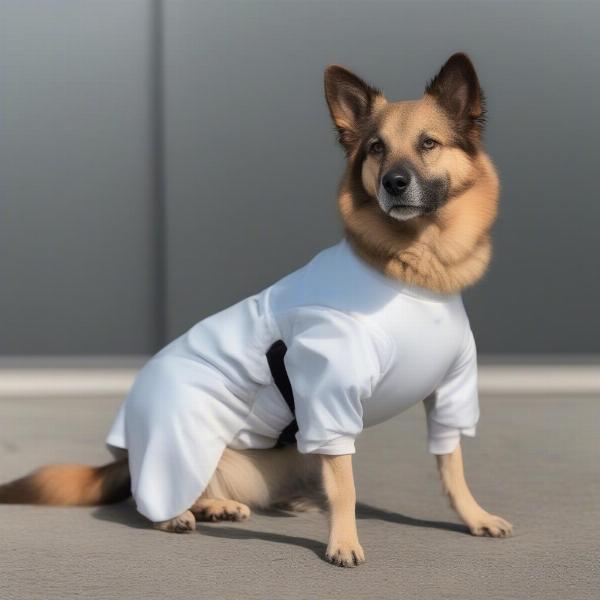Using glue for wounds on dogs can seem like a quick fix, but it’s essential to understand when it’s appropriate and when it’s not. This guide will cover the types of glue available, how to use them safely, and when to seek veterinary care for your furry friend. Choosing the right treatment for your dog’s wound is crucial for proper healing and preventing complications.
Types of Glue Suitable for Dog Wounds
Not all glues are created equal, and some are specifically designed for veterinary use. Cyanoacrylate adhesives, often referred to as “skin glue” or “tissue adhesive,” are the most common type used on dogs. These adhesives form a strong bond, closing the wound and providing a barrier against infection.
There are different formulations of cyanoacrylate glues, some of which are more flexible than others. Your veterinarian can help you choose the most appropriate type for your dog’s specific wound. Never use super glue or other household adhesives on your dog, as they can be toxic and cause further irritation.
It’s crucial to differentiate between appropriate wound glue and other types of adhesives. While surgical glue for dogs is a safe and effective option for certain wounds, using the wrong type of glue can be harmful.
Applying Glue to Your Dog’s Wound: A Step-by-Step Guide
Before applying any glue, the wound must be thoroughly cleaned and disinfected. Clip away any hair surrounding the wound to prevent it from becoming trapped in the adhesive.
Make sure the wound is dry before applying the glue. Apply a thin layer of adhesive directly to the wound edges, bringing them together gently. Hold the edges together for a few seconds to allow the glue to set. Avoid getting glue on the surrounding fur.
Once the glue has dried, monitor the wound for any signs of infection, such as redness, swelling, or discharge. If you notice any of these signs, contact your veterinarian immediately.
When to Seek Veterinary Care
While glue can be useful for minor cuts and lacerations, it’s not suitable for all wounds. Deep wounds, puncture wounds, or wounds that are contaminated or infected require professional veterinary attention. glue for cuts on dogs
If the wound is bleeding heavily, or if you’re unable to close the wound edges easily, seek veterinary care immediately. Your veterinarian can determine the best course of action, which may involve stitches, staples, or other wound closure techniques. surgical glue for dogs
Alternatives to Glue for Dog Wounds
Depending on the nature and severity of the wound, there are alternatives to glue. These include traditional stitches or staples, wound dressings, and surgical suits. surgical suit for dogs Your veterinarian can advise you on the most suitable option for your dog’s individual needs. wound glue for dogs For superficial abrasions, keeping the area clean and dry may be sufficient.
 Dog Wearing Surgical Suit
Dog Wearing Surgical Suit
Conclusion
Glue can be a convenient and effective way to treat minor wounds on dogs. However, it’s crucial to choose the right type of glue and apply it correctly. Always consult with your veterinarian if you’re unsure whether glue is appropriate for your dog’s wound, or if you notice any signs of infection. Proper wound care is essential for your dog’s health and well-being. skin glue for dogs
FAQ
-
Can I use super glue on my dog’s wound? No, never use super glue or other household adhesives on your dog. These can be toxic and harmful.
-
How do I clean my dog’s wound before applying glue? Use a mild antiseptic solution and clean cotton wool or gauze.
-
What should I do if the wound is bleeding heavily? Seek immediate veterinary attention.
-
Can I use glue on a deep wound? No, deep wounds require professional veterinary care.
-
What are the signs of a wound infection? Redness, swelling, discharge, heat, and pain.
-
What are some alternatives to glue for dog wounds? Stitches, staples, wound dressings, and surgical suits.
-
How long does it take for wound glue to dry? Typically, within a few seconds.
ILM Dog is your trusted source for expert advice on dog care, including breed selection, health, training, nutrition, grooming, and much more. We offer a wide range of resources to help you provide the best possible care for your canine companion. From puppy care to senior dog support, we’re here to guide you every step of the way. Contact us for personalized guidance: Email: [email protected], Phone: +44 20-3965-8624. ILM Dog is committed to helping you navigate the joys and challenges of dog ownership.